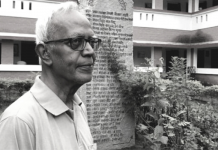Birsa Munda was an Indian tribal leader who had a huge role to play in the Indian freedom struggle. He was a much celebrated folk hero belonging to the Munda tribe(of present day Jharkhand). He is responsible for spearheading a tribal movement in the late 19th century during the British raj, this made him an iconic figure of the Indian freedom movement. The revolt that Munda spearheaded mainly concentrated in the Munda belt of Tamar, Khunti, Sarwada and Bangaon.
He is best known as a folk hero who gave the British sleepless nights. He truly was a tribal revolutionary who managed to even scare off the British colonialists. He was a tribal leader belonging to the Chota Nagpur plateau of Jharkhand, he was a truly fearless and committed leader. He died at the age of 25 in the custody of the British authorities in the Central Jail of Ranchi. As a child Munda went to a missionary school for a brief period of time before he finally quit.
It was on the advice of his teacher that Birsa converted to Christianity. Conversion alone would allow him entry into the German Mission School, an idea that was to profoundly impact him later in life. Munda began to get more and more aware about the missionary zeal of converting the tribal population of India into Christianity and to protest against this forceful conversion Munda started the faith of ‘Birsait.’
Many members f the Munda and the Oraon tribal communities began joining the Birsait faith and it posed a major challenge to the British mission for conversion of tribals into Christianity.
Some of the most important and significant years that casted a deep impression on Munda’s vision were spent in the Chaibasa town of modern day Jharkhand. He was close to the heart of the Sardars agitation, the lesson that young Birsa Munda learnt from his engagement there was that the British wanted to overrun the local tribal communities through a combination of government sponsored exploitation and missionary work.
As a result of this realisation, in 1890 Birsa Munda quit the German Mission School, ceased being a Christian and returned back to his original tribal faith. After he left Chaibasa in 1890, Birsa Munda fully dedicated himself to the struggle against British colonialism. What Munda also noticed was the fact that the colonialists were successfully destroying the tribal way of life especially of the Santhal and the Munda communities by introducing structures for rent payment for the land and began taxing the produce.
Ironically, most local zamindars agreed to become party to the exploitation of the local tribes and this further contributed to their exploitation.
Most landless tribals became helpless bonded labourers. Birsa Munda responded to the gross exploitation of his people, Birsa and his followers started the “Ulgulam”(The Great Tumult)or the great rebellion against the British colonialists.
The movement’s main aim was to reassert the rights of the tribal community as the real owners of the soil and the expulsion of both the British colonialists as well as the selfish zamindars.
The movement was marked by a series of guerrilla attacks on the British, killing many of the British police officers.
Birsa Munda asserted that forest produce duly belonged to the Adivasis and that is why in 1894, Birsa mobilised his people for a remission of forest dues that the local zamindars collected.
This mobilisation brought together other trips such as the Oraon, the Munda and Kharias on a single platform.
Munda encouraged all those taking part in the rebellion to boycott and not cooperate with either the British or the zamindars in any manner. He was imprisoned for two years at the Hazaribagh Central Jail for the mobilisations that he created.
Post his release. Munda committed himself even more to the cause of Indian freedom. It was in August 1897 that Munda organised 400 of his men, all armed with bows and arrows and they together attached the Khunti police station. In 1898, the Mundas faced a British force that they first defeated.
Later the British imprisoned many men and women of the Munda tribe.
Birsa Munda did not just limit his struggle to the British but also sought to fight the dark cloud of ignorance amongst his own community.
He worked extensively to free the Munda community from religious superstition, alcoholism and animal sacrifice.
He asserted the importance of knowing and feeling proud of one’s own roots, while simultaneously trying to fight internal darkness.
He tried to inspire his followers to understand the importance of owning one’s land and asserting a voice for their own dignity.
The mighty British empire could not afford to turn a blind eye to Munda and responded to his rebellion by increasing the extent and degree of its exploitative and unjust practices. Birsa Munda was imprisoned in 1990 and experienced extensive brutal torture, Birsa passed away on June 9,1990. British authorities claimed that he died of Cholera but the truth is that he succumbed to his injuries. It was as a result of Birsa Munda’s relentless fight that the British were compelled to pass the Chota Nagpur Tenancy Act, which restricted the sale of land belonging to the Adivasis to non-Adivasi clients.
It is impossible for us to put into words or even imagine the magnanimity of the contributions made by Birsa Munda. The state of Jharkhand was born on his birthday, November 15.
It is ironic that even after independence and decades after his death, the plight of the tribal community in India is replete with stories of exploitation and anguish, pain and injustice.
Birsa Munda was an example of immense courage and visionary zeal, his determination to fight against the British to restore the dignity of the tribal people continues to remind us of the failure of the post-independent Indian nation-state.
He gave up his life for the sake of the freedom of the tribal people, but have we honoured his vision in contemporary India?














